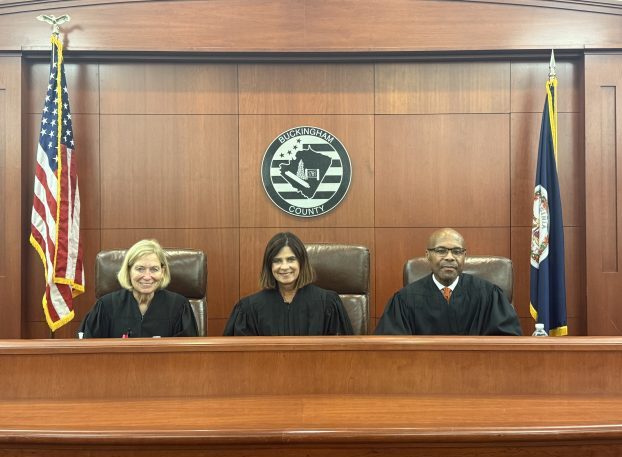Tap Fees Reduced? Farmville council has questions about proposal
Published 1:15 am Tuesday, November 12, 2024
|
Getting your Trinity Audio player ready...
|
Should the Town of Farmville lower its tap fees for developers? Before giving an answer, council members want some more information.
A tap fee is what’s paid to allow a property to “tap” into the water and sewer system. In Farmville, it’s $4,000 for water and $4,000 for sewer per house in a subdivision. However, during the group’s meeting on Wednesday, Nov. 6 meeting, council members learned when you add in labor, equipment and material, it cost the town between $5,600 to $5,700 each time to install a tap.
The problem, current Farmville Town Manager Dr. Scott Davis pointed out, is that this only happens once. The town gets a one-time tap fee and then is on the hook to maintain that water and sewer connection indefinitely. That means the tap fee is the only time Farmville has a chance to get the developer to help pay for the maintenance, so it needs to be more than the combined total of labor and materials.
Council member Thomas Pairet had pointed out last month the previous town manager, Gerald Spates, had urged the council to cut tap fees for a two-year period, in order to promote growth and investment. Also, the town did it as a way to help with growth twice in the last seven years. But what the data shows is that while those earlier reductions did encourage developers to go ahead and turn on the tap, the town lost money every time.
Breaking down the numbers
In Fiscal Year 2015-16, the council approved a $3,000 reduction per tap. According to the town records, when everything was factored in, that decision cost Farmville $114,500. One year later, in Fiscal Year 2016-17, the council adopted a $2,000 reduction per tap. That cost the town $62,000. To be clear, these were one-time losses, while the town was then able to charge for water and sewer fees on a monthly basis, once the tap was turned on.
The biggest question council members had, however, stemmed from another number. Farmville’s water and sewer tap fees are some of the highest in the region, more than double in a few cases. Again, in Farmville, the cost is $4,000 per water and sewer tap. The Town of Appomattox charges $2,500 for water and $3,000 for sewer. The Town of South Hill charges $2,000 for water and $3,000 for sewer. In the Town of Blacksburg, it’s $1,500 each for water and sewer, while the City of Lynchburg charges $1,150 for water and $1,330 for sewer. In Lexington, it’s $2,122 for water and $2,060 for sewer.
“How can all these other locations do it for less than what we’re doing?” council member Thomas Pairet asked Davis.
The response was I don’t know.
“I’m not sure what they do,” Davis said, adding that some towns and cities don’t raise their rates in an effective way over time, to make sure they cover the costs involved. Others either pull too much from their enterprise fund for other projects or don’t have one at all, meaning any additional costs for water and sewer beyond the tap fees come out of the general fund each time, from property taxes.
“How we operate is how we should be doing business,” Davis said.
Pairet said he heard what Davis was saying, but the numbers were still surprising.
“I just see, when I look at the figures you presented to us, in most cases we’re almost twice what anybody else is as far as water and sewer fees.”
What about a tap fees discount?
Council members weren’t quite ready to commit to any specific discount. Council member John Hardy suggested a changing discount, one that increases based on the number of homes that get built.
“I realize there is a cost of doing business and I would hate for us to operate at a loss, but I would like to see some incentive for builders,” Hardy said.
He proposed that if someone was building one to five homes, maybe they get a 25% discount on tap fees. If it’s a developer building between six to 25, then maybe they get 50% and if it’s 25 or above, maybe they get 75% off. He argued that a 25-home subdivision would mean significantly more people in town, it would generate taxes on the property and a food tax, as they eat in town.
“I just think we should have some sort of incentive,” Hardy said.
Pairet proposed a smaller reduction, but asked if Farmville should increase water and sewer rates, in order to make up the difference they would lose from developers getting the discount.
“At that point, you’re putting the cost on people who currently have property, on the backs of them for somebody else,” Davis cautioned.
Pairet acknowledged that and withdrew the suggestion.
Council member Adam Yoelin asked for more information, so the council would know what they’re dealing with. He asked staff to look into and provide at a later council meeting the actual cost of supplies, the cost of labor and present the numbers so they can see how these other towns and cities are doing it so cheap.
“(I’m) just trying to figure out why ours is so expensive,” Yoelin said.
Other council members agreed and that’s where they left it, with staff going back to research the requested data.






